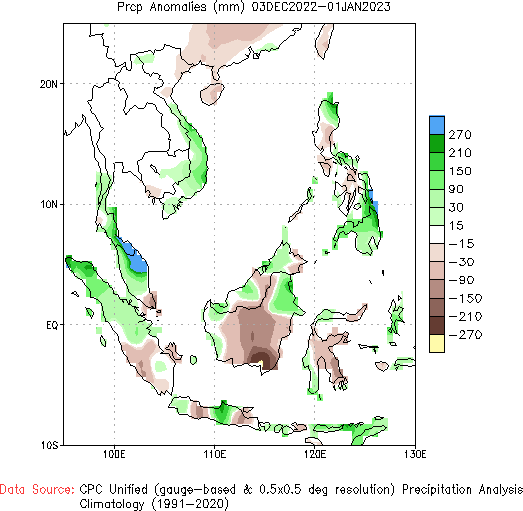December has always been the monsoonal flooding season for Peninsular Malaysia’s northern East Coast states (Kelantan and Terengganu). This year’s flood is reportedly “extraordinary” as the rainfall intensity was 627mm in a day. This is the highest in 55 years. It broke the record of 608mm logged in Kota Baru in 1967.
By 21 December 2022, 32,089 people in Kelantan were displaced to relief centres. In Terengganu, at least 40,000 people were affected at the height of the disaster.
Also memorable were the year-end floods in 2014 - 2015 where over 200,000 people were affected and 24 killed. Over a period of three days (21-23 December 2014), a record-setting 1295mm fell, equivalent to 64 regular days of rain.
These images show the 30-day accumulated precipitation and anomalies of the region from CPC Unified data. In the 30 days to 1 Jan 2023, accumulated precipitation on the East Coast was estimated at 900mm (see the red zones in the image on the left) which was 270mm above typical (see the blue zone in image on the right). These are very high readings. Kelantan is now preparing for a possible second wave of flood.
Note:
“Southeast Asia is globally considered one of the most vulnerable regions to climate change. Countries across the region will face rising sea levels, heat waves, floods and droughts, and increasingly intense and unpredictable weather events” (USAID, Jul 2022). The conversation is turning toward a fair approach to funding efforts on climate change.
In Khazanah Research Institute (2022) recent Climate Strategy report: "Nationally and locally, we should be focusing on climate adaptation measures: urban greening to tackle urban heatwaves, flood mitigation and better planning to minimise the impact of the great rains, mangrove restoration and engineering works to combat coastal erosion. These measures are not rocket science, we have the local expertise and technology to pull much of this off, unlike with energy transition measures. However, we need to tap into more national and international financing to bring these solutions online. It can be done. Think City in Penang has recently secured US$10 million in climate adaptation financing to tackle heat and floods."
Comment: Although there is no specific mention of East Coast flooding and the cost of mitigation there, we should expect more focus on this to come.
Here are some recent initiatives by the Malaysia government for flood mitigation on the East Coast:
Under the 12th Malaysian Plan, RM9.19 billion was allocated for flood mitigation projects nationwide with Kelantan receiving RM1.3 billion for four projects and Terengganu receiving RM450 million for nine projects (TheStar, 2021).
In 2022, there will be 15 works to be implemented in Kuala Krai with an estimated cost of RM 1.1 million (TheMalaysianReserve, 2022).
40 ongoing and planned flood mitigation projects in the East Cost for 2023. One of the major projects, the Sungai Kelantan Integrated River Basin Development Project (PLSB), is estimated to be at RM 2.156 billion (TheStar, 2022).
In our coverage at PalmTrack, we also monitor rainfall in the region. This has a focus on the core oil palm growing regions of Indonesia and Malaysia.
research@segi-enam.com | 4 Jan 2023

































